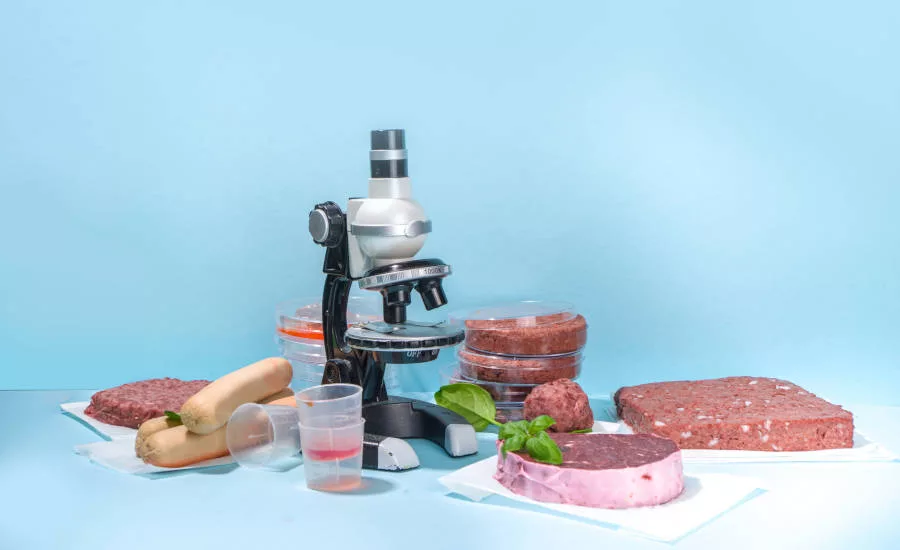The Future of Lab-Grown Meat: A Sustainable Solution for the Future

Meat has been a human staple for thousands of years, but the dynamics of meat consumption are evolving. Today, Americans consume nearly 300 pounds of red meat and poultry per capita every year. However, over the past two decades, a shift in attitudes towards health and sustainability has led to a slight decline in meat consumption.
Is it a sign that the meat production landscape is poised for transformation as our world grapples with climate change and a burgeoning global population?
Sponsored by

This article delves into the latest progress on one of the potential meat alternatives: lab-grown meat. Also known as cultured or cultivated meat, many think it has the potential to revolutionize our food industry.
Lab-Grown Meat: A Sustainable Alternative
Backed by substantial investments exceeding $2 billion worldwide, lab-grown meat technologies offer significant environmental and economic benefits compared to traditional meat production. Notably, meat production contributes to almost 60% of all greenhouse gas emissions associated with food production, surpassing the pollution generated by plant crop cultivation.
The Lab-Grown Meat Production Process
Producing lab-grown meat commences with a minute sample of animal stem cells cultivated in controlled laboratory conditions. Producers introduce essential amino acids and carbohydrates, creating an optimal environment for cell multiplication. These cells follow the genetic blueprint of animal muscle tissue, resulting in a product closely resembling ground beef. At an industrial scale, lab-grown meat is cultivated in large stainless steel vats and then undergoes additional processing to render it the texture and appearance of conventional cuts of meat.
Why the Investment Makes Sense
The eventual inevitability of cultivated meat products on store shelves and in the wholesale food service supply stream presents a range of advantages and disadvantages that impact the food industry and the broader economy.
As with most emerging technologies, the long-term implications remain subject to speculation. Nevertheless, the food industry is committed to making lab-grown meat a reality in the near future.
The Benefits of Cultivated Meat
Cultivated meat products offer a range of benefits to suppliers, consumers and the planet.
Sustainable supply. Lab-grown meat can help to meet the rising global demand for meat more sustainably. While US meat consumption has seen a modest decline, global meat consumption has doubled over the past two decades, with projections indicating a further 13% increase by 2030. Experts anticipate that alternative proteins, including plant-based options and lab-grown meats, will be crucial in meeting this growing demand.
Land use efficiency. Traditional livestock farming occupies approximately 70% of the world's arable land, limiting the space available for plant crop cultivation. Lab-grown meat has a land use footprint 99% smaller than industrial-scale livestock farming, conserving valuable agricultural land.
Water conservation. Lab-grown meat is remarkably efficient in water usage, requiring between 82% and 96% less water per kilogram than conventional beef production. This reduction is significant given that beef production consumes an astounding 15,415 liters of water per kilogram.
Regional sustainability. Globalized food production, with meat transported across long distances, exacerbates environmental issues. Lab-grown meat could offer regional and local alternatives that are both environmentally sustainable and economically viable.
Improved animal welfare. Advocates of meat alternatives often cite concerns about the inhumane treatment of factory-farmed animals. Lab-grown meat and plant-based proteins can potentially reduce the demand for conventionally farmed meat and the harvesting of animals.
Potential Consequences of Lab-Grown Meat
Even though it offers numerous benefits, introducing lab-grown meat into the market may have some harmful real-world effects.
1. Employment impact: If the market price of lab-grown meat drops low enough to compete with traditional agriculture and meat processing, it could shift employment away from these sectors.
2. Overconsumption concerns: There is a theoretical worry that the availability of low-fat lab-grown meat might lead to increased consumption in specific populations, exacerbating the global obesity crisis.
The Road Ahead: Regulation and Adoption
The US Food and Drug Administration (FDA) has begun approving lab-grown meat products, expecting to see these options in restaurants as early as 2023, and on retail shelves by 2028. However, it may still take years and possibly even decades before the lab-grown meat industry can capture a significant market share. But leading food industry giants, such as Tyson Foods and JBS Foods, are actively supporting this endeavor with venture capital.
Are Consumers Ready?
While the demand for sustainably produced foods is rising, the transition to lab-grown meats may take time. A study revealed that 35% of meat-eaters and 55% of vegetarians are not interested in trying lab-grown meat. However, as consumer attitudes evolve and they become more accustomed to the idea, the adoption of lab-grown meat may gain momentum.
Be Ready for What Comes Next with Tilley Distribution
Lab-grown meat represents a promising avenue for transforming the traditional meat production landscape, addressing climate change and enhancing food security in a world with a growing population. With significant investments, growing consumer interest and regulatory approvals, the era of lab-grown meat is likely on the horizon. While challenges and uncertainties remain, the potential benefits make it a compelling solution for our changing world. Expand your organization’s horizons with a proven ingredients partner. Speak with a Tilley Distribution representative today.